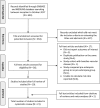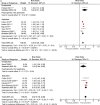Preterm Delivery and Future Risk of Maternal Cardiovascular Disease: A Systematic Review and Meta-Analysis
- PMID: 29335319
- PMCID: PMC5850169
- DOI: 10.1161/JAHA.117.007809
Preterm Delivery and Future Risk of Maternal Cardiovascular Disease: A Systematic Review and Meta-Analysis
Abstract
Background: Preterm delivery (<37 weeks gestational age) affects 11% of all pregnancies, but data are conflicting whether preterm birth is associated with long-term adverse maternal cardiovascular outcomes. We aimed to systematically evaluate and summarize the evidence on the relationship between preterm birth and future maternal risk of cardiovascular diseases.
Methods and results: A systematic search of MEDLINE and EMBASE was performed to identify relevant studies that evaluated the association between preterm birth and future maternal risk of composite cardiovascular disease, coronary heart disease, stroke, and death caused by cardiovascular or coronary heart disease and stroke. We quantified the associations using random effects meta-analysis. Twenty-one studies with over 5.8 million women, including over 338 000 women with previous preterm deliveries, were identified. Meta-analysis of studies that adjusted for potential confounders showed that preterm birth was associated with an increased risk of maternal future cardiovascular disease (risk ratio [RR] 1.43, 95% confidence interval [CI], 1.18, 1.72), cardiovascular disease death (RR 1.78, 95% CI, 1.42, 2.21), coronary heart disease (RR 1.49, 95% CI, 1.38, 1.60), coronary heart disease death (RR 2.10, 95% CI, 1.87, 2.36), and stroke (RR 1.65, 95% CI, 1.51, 1.79). Sensitivity analysis showed that the highest risks occurred when the preterm deliveries occurred before 32 weeks gestation or were medically indicated.
Conclusions: Preterm delivery is associated with an increase in future maternal adverse cardiovascular outcomes, including a 2-fold increase in deaths caused by coronary heart disease. These findings support the assessment of preterm delivery in cardiovascular risk assessment in women.
Keywords: cardiovascular disease risk factors; coronary heart disease risk; long‐term outcome; pregnancy and postpartum; stroke.
© 2018 The Authors. Published on behalf of the American Heart Association, Inc., by Wiley.
Figures




References
-
- Liu L, Oza S, Hogan D, Perin J, Rudan I, Lawn JE, Cousens S, Mathers C, Black RE. Global, regional, and national causes of child mortality in 2000–13, with projections to inform post‐2015 priorities: an updated systematic analysis. Lancet. 2015;385:430–440. - PubMed
-
- Heida KY, Velthuis BK, Oudijk MA, Reitsma JB, Bots ML, Franx A, van Dunné FM. Cardiovascular disease risk in women with a history of spontaneous preterm delivery: a systematic review and meta‐analysis. Eur J Prev Cardiol. 2015;23:253–263. - PubMed
Publication types
MeSH terms
Grants and funding
LinkOut - more resources
Full Text Sources
Other Literature Sources

